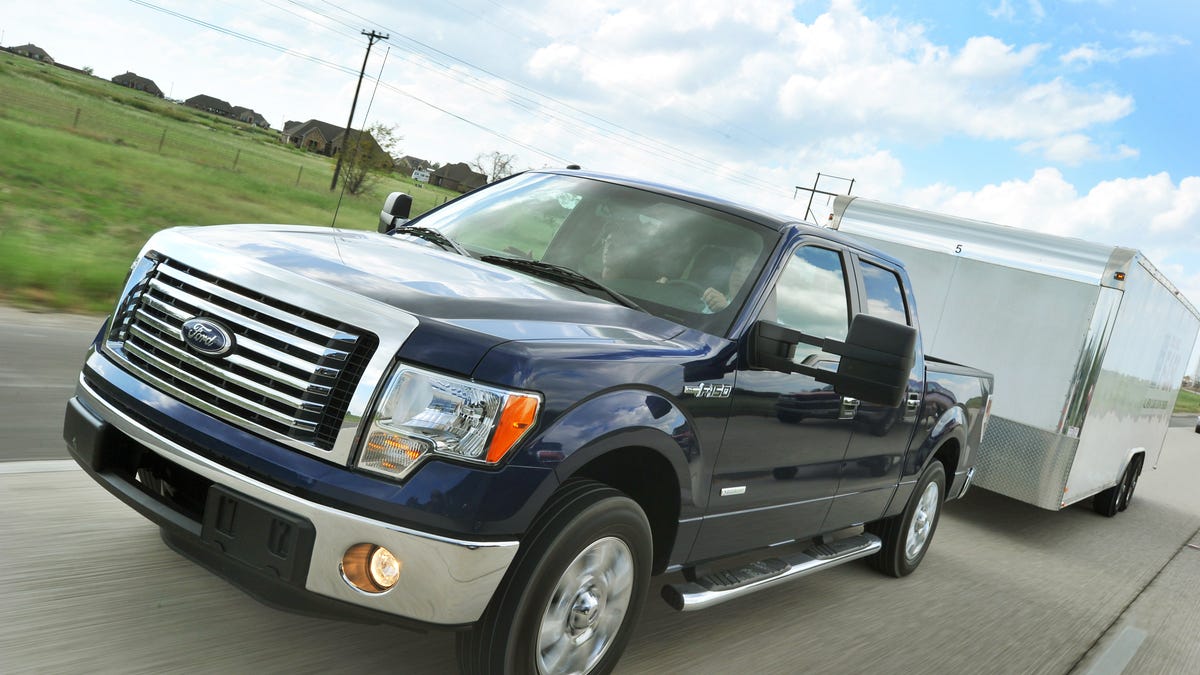Why the Ford-Toyota hybrid tie-up is a big deal
Hybrids are moving from a niche for eco-minded drivers toward a mainstream solution for boosting fuel economy across all classes of vehicles.

Ford and Toyota today announced a surprise agreement to co-develop a hybrid powertrain for rear-wheel-drive light trucks and SUVs in an effort to share development costs.
The collaboration means that there will be far more people than just Prius drivers who can boast the superior mileage of hybrids. Now people more concerned with horsepower and towing torque will be introduced to a technology once pigeonholed as way to show off drivers' environmental bona fides. Common sense, it seems, has finally found its way to SUV and truck makers.
Since both companies already have front-wheel-drive hybrid systems, this new architecture, expected later this decade, fills a hole in their technology platforms. But for consumers and the rest of the auto industry, the announcement is a clear endorsement of hybrid technology. Combined with other fuel-saving tricks, hybrids are poised to spread beyond niche status and bring better fuel economy to a broader range of vehicles.
"This is the kind of collaborative effort that is required to address the big global challenges of energy independence and environmental sustainability," Ford CEO Alan Mulally said in a statement.
Altruism is nice, but this is also about smart business. Ford and Toyota will continue to make their own vehicles. They'll compete truck for truck, just as you may expect. But this deal is about sharing resources, raising the bar for hybrid development, and getting it done as quickly as possible.
A chance meeting between Mulally and Toyota chief Akio Toyoda in an airport helped spark discussions but formal talks began in April, according to reports. During a press conference today, Toyota said that U.S. buyers don't appear to be willing to give up their large vehicles, which drove the companies to work together on hybrids for SUVs and light trucks.
"Our collaboration with Ford is a move to make hybrid technology more widely available in sport-utility vehicles and in trucks. Those kinds of models are indispensable to American customers. And providing them with our hybrid technology will help conserve energy and reduce output of greenhouse gas here in the United States," said Toyota Executive Vice President Takeshi Uchiyamada.
Plug-ins versus hybrids
The question of which technologies offer the best route to improved fuel efficiency has taken on new urgency in the wake of more stringent EPA fuel economy standards announced last month.
Electric cars and plug-in hybrids benefit from plenty of buzz, but experts say that automakers can meet those ambitious goals mainly by engine improvements and hybrids. There still is a role for all-electric vehicles and plug-in hybrids, which are the same as traditional hybrids but have a larger battery. In the next year, both Ford and Toyota plan to introduce all-electric vehicles, such as the electric Ford Focus and electric RAV4 SUV, as well as plug-in hybrids.
Plug-in vehicles will appeal to consumers who want to cut down their oil consumption, lower their daily driving costs, and have the most environmentally friendly car possible. Fleet operators are also natural buyers of plug-in vehicles since they have well-understood driving routes and will highly value lower operating expenses from cheaper fuel (electricity).
But hybrids mitigate the big downside of plug-ins: battery costs. A lithium ion battery pack for a sedan with a range of about 100 miles costs in the neighborhood of $10,000. Those costs will come down with better technology and manufacturing scale, but there's no clear technical breakthrough which will make EVs undercut fuel-efficient gas cars on purchase price alone.
Traditional hybrids also add costs, but Ford and Toyota's announcement today demonstrates their belief the additional costs will deliver significant benefits in fuel savings. Combined, the two auto companies have already solid millions of hybrids over the past decade, so the technology is mature and relatively familiar to consumers.
And when it comes to electrification, a little bit goes a long way. In addition to traditional hybrids, automakers are making so-called microhybrids where a small energy device will run a car's electronics when it's idle. That battery also helps during acceleration and recuperates energy from braking.
There are still questions over the environmental benefits of plug-in electric vehicles, too. If the source for electricity is from coal, the greenhouse gas profile of a plug-in hybrid, when measured over the entire lifecycle, is about the same as a hybrid, according to a report done by the Electric Power Research Institute.
In the end, automakers will be pragmatic and use every tool available to them and not count on one way to do it.
"We will continue to improve the internal combustion engine, take weight out of vehicles, and work on aerodynamics--all that work is still going," said Ford representative Alan Hall. "This is where we need to take light trucks in order to meet customer expectations."
And in a few years, those customers will get to have their trucks without the pain they experience today at the gas pump. Thankfully, automakers have agreed that better fuel efficiency is an industry-wide priority and hybrid technology is one available means for getting there.

